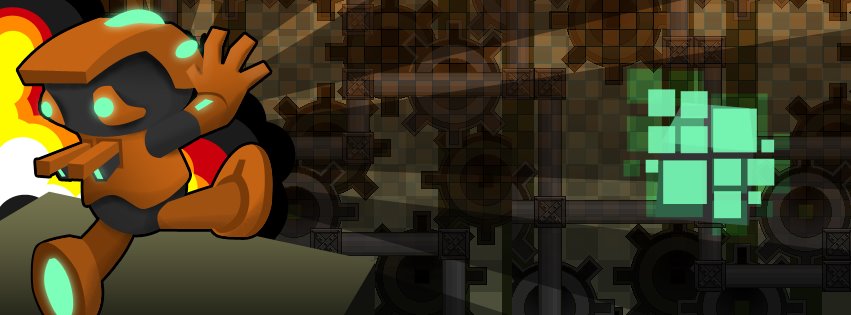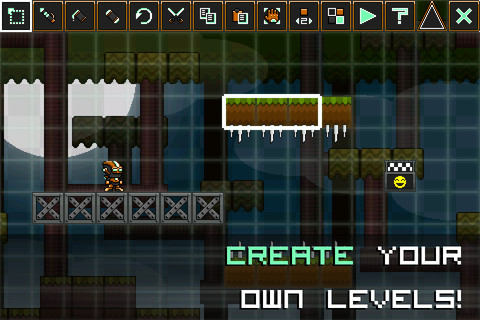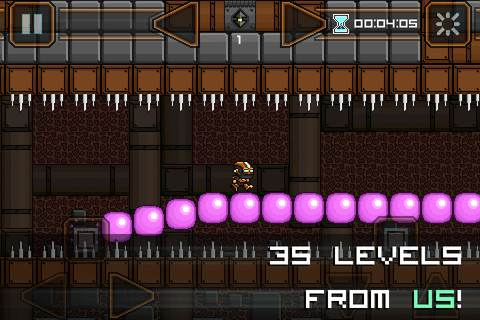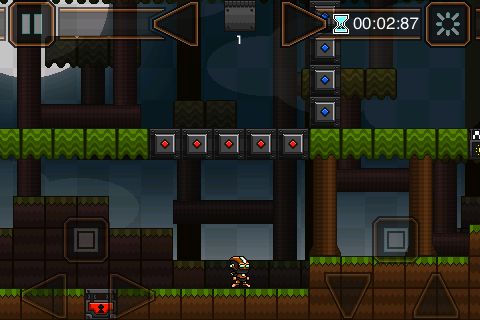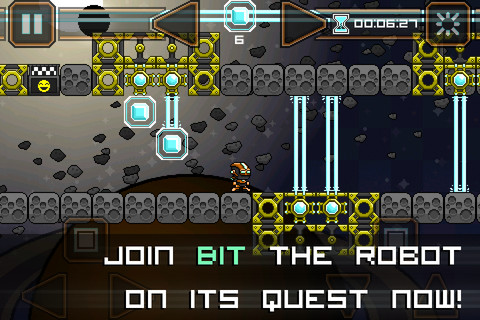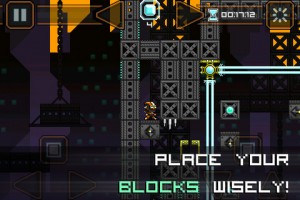Interview with one half of Hamilton’s Green Pixel, “Indie” Game Developer: Rich Halliday
![]() If you were at McMaster for DemoCampHamilton6, you would have seen the amazing new game BlockHopper (available on iOS) from Green Pixel (@GreenPixelDev) . Green Pixel demonstrated the core mechanics, level editor, and amazing graphics to the 200 onlookers at the event. They put more than a year into the game, and successfully released it on the App Store with a flash port coming soon. I got the chance to talk to one half of the team, developer Rich Halliday:
If you were at McMaster for DemoCampHamilton6, you would have seen the amazing new game BlockHopper (available on iOS) from Green Pixel (@GreenPixelDev) . Green Pixel demonstrated the core mechanics, level editor, and amazing graphics to the 200 onlookers at the event. They put more than a year into the game, and successfully released it on the App Store with a flash port coming soon. I got the chance to talk to one half of the team, developer Rich Halliday:
So can you tell us a little about yourself good sir
My name is Rich Halliday and I work with my artist friend as an indie developer. I hesitate to use the term “indie” at the risk of sounding pretentious, but it just means that we design, build and release our own games. I came to Hamilton in 2006 solely because my girlfriend was a masters student at McMaster. I found a job in Burlington and I was able to live in Hamilton and commute. We continued living here even after I started working in Toronto because Hamilton is more our style.
I was fortunate growing up that my parents always had a decent computer. I remember one day finding a book on the BASIC programming language at my elementary school. I was only copying programs from the book at that time, but it blew my mind that I was able to build something from nothing. To this day I still love the fact that you can go from an empty text file to something you can interact with in a few hours. I love to create things, but I suck at drawing or any sort of physical art so I find programming lets me explore my creative side. I also really enjoy the instant feedback, when you finally get your program working you know it works right away. I always hated waiting a week or so getting a math assignment back. 
I chose a career in games at first just because they’re my favorite thing to do in my spare time. It wasn’t until I started in the industry that I realized it was a perfect fit as it’s pretty challenging work and if you get bored or stuck doing something, you can usually leave it for later and work on some other area of the game.
Did you go to school for computer science or game development? What’s your take on that?
I have a computer science degree from Acadia University. I think about the value quite often actually! I go back and forth but I think ultimately it was a good choice. A lot of companies won’t even look at you unless you have a CS or math degree, so breaking in as a programmer might be tough. I think it depends on your ultimate career path. If you just want to work for yourself or make games as a hobby, I think the 1 or 2 year college game design course is fine. They usually teach you about working with a specific engine like Unity or Unreal and maybe some scripting with Lua or ActionScript. The problem with that is your knowledge becomes very specific and a lot of the bigger companies will use a modified version of these engines or, more often, their own engine that they constantly refine in-house. I’d say if you intend to work for a BioWare or a Valve, a computer science degree is mandatory as they’ll expect you to know how to optimize your code for different hardware. Basically, if you want to work on any of the main consoles or handhelds or for any of the larger game companies you’ll need a CS degree from a university.
So what did you do after university?
I worked for Capcom Mobile for 6 months in 2006. It was my first real job after university and they had a great team when I started. The lead programmer at the time would come around every few days to see how things were going. He was really good at pointing out the good things you had done and also areas that could use improvements. I learned an incredible amount during that time. About 3 months in, there was a shakeup and he ended up leaving. The new guy in charge of the programmers didn’t come from a technical background and was really only worried about deadlines and not too interested in improving the talents of the team. So I guess the two bosses I had were the best and worst experience!
I left Capcom Mobile just after Christmas in 2006 with 5 other employees due to “dismissal without cause”. We weren’t really given a reason, but we were all hired by the same lead programmer who ended up quitting since they effectively wanted him to take a demotion. We figured since we were his guys, we also got the boot haha. I was bummed at the time, but from what I heard from the people who stayed, things weren’t much fun there. As of today, everyone I kept in touch with has a better job with a different company. It was pretty much Capcom in name only, they just bought a local mobile developer and acquired the licenses to their current IP.
After going through one company that had to close due to bankruptcy and being part of an unsuccessful start-up, we thought we had seen enough of the development cycle that we could do it ourselves. We worked together at these previous two companies and tend to like the same type of games. We enjoy the SNES/PS1 era and figured the only way to work on these types of games is to do it ourselves. Living on an indie budget is not for everyone, that’s for sure. We’re both fortunate to have our significant others picking up most of the tab. You really have to plan to not have an income for 1 or 2 years as you’re truly starting from scratch. At first no one knows who you are, so unless you happen to make an amazing game that takes the world by storm, the best you can hope for from your first release is attracting some fans. Currently, most of our profits go into things like server costs, outsourcing music and buying any development software we need. We use a lot of free tools and build a lot of our own tools for the more specific needs.
Your first projects were The Pocalypse and The Pocalypse Defense.
They were the first projects! Joe really does the web comic, The Pocalypse, by himself. ThePocalypse Defense was a starter project to see if we could work together to make a game from start to finish. Since Joe lives in Japan, we haven’t had a face-to-face meeting for about two years now so just finishing and releasing the project was considered success for us.
Joe and I worked together at Silverbirch Studios and Electron Jump. We are friends outside of work which really helps as we like talking about the games we are playing. None of my other friends are into games at all, so maybe it’s good that I save all my news and opinions for the guy I work with.
Hypothetically speaking, what would you want in a third teammate?
I think the best thing you can bring is passion. I’ve never had to hire anyone before and if that day ever comes, I think I’d need someone who likes messing around with code and game ideas in their spare time. I know the debate on whether games are art or not rages on, but I definitely do it as an art form, so I’d need to work with someone who shares that view rather than a way to make money. I like to work with people rather than manage, so they’d have to be pretty self-reliant and also bring their own ideas and be open to discussion.
What’s your take on the Flash platform?
It was the first time doing anything in flash for either of us. I liked working with ActionScript and now I use it to prototype all my ideas just because it’s so fast and forgiving. There has been rumblings of Flash is Dead! for a few years now and we’ll move on to something else when it truly does die but right now Newgrounds, Kongregate and Armor Games are all still running flash. From the outset, we wanted to distance ourselves as far as possible from the flash IDE so we wouldn’t get caught in the trap of only knowing how to make flash games. We have our own animation system and we use sprite sheets so everything is modular and easy to port. Flash and iOS will be our two main platforms for now, but I’m thinking of adding PC and Mac as well.
The cost of development is the biggest factor and most of these are free (iOS costs $100 a year developer fee) compared to consoles which can run you from $2000 – $20,000 for dev kits. The main reason for starting in flash and moving to iOS was due to the fact I had never developed for iOS or used Objective-C before even though I have a lot of experience working with C. I thought the new platform and new language might provide enough of their own challenges without developing the side-scrolling platforming logic on top.
So how would you describe BlockHopper? You said reception was good but there were some issues with the iOS crowd, can you elaborate?
Well, reception has been mostly positive! For the first few weeks, I was active on the TouchArcade forums. A lot of people had good things to say. We got some good reviews and some poor reviews. I think overall, iOS was not the best platform for this game. Most of the negative reviews are from people finding it too hard which is funny because it was originally much harder like Super Meat Boy. A lot of people tell me they haven’t gotten passed level 4 or 5 out of 35, so it’s pretty obvious it’s too hard for the general iOS audience. I think the flash version will be better received as it tends to play much better with the mouse and keyboard and maybe some day we’ll make a PC/Mac version. It was a great experience though, knowing your audience is a good lesson to learn.
We had this discussion the other day whether or not to update BlockHopper with new levels and game play or just forge ahead on the next game. We decided to just go ahead and make something new unless there is some huge bug that needs to be fixed. We had planned on expanding the game play and adding Universal iPad support for the first update, but our sales have dropped off and I think most people have moved on to other things now. I think since we’re only two people, we have to keep moving forward as quickly as possible but if enough people ask for (reasonable) changes, we’re happy to do them!
BlockHopper is now published in the App Store. You mentioned some tax hurdles in your blog, did you require a lawyer or did you manage to get it all completed on your own?
We didn’t need a lawyer, but our story is not uncommon. If you’re new to iOS, get the tax forms in as soon as possible. Even if you haven’t started your game yet. You fill out the forms on the iTunes portal but they can still take a few months to be processed. Until they are, you can’t sell your game. We made the mistake of filling out the tax forms when we submitted our game to the App Store so it was approved on December 23, but didn’t actually go on sale until the middle of February. If you’re a Canadian dev, you have to fill out a second set of physical forms that you mail off. If you don’t fill these out, you get docked 30% of each sale for GST. The good news is you only have to do these things once!
You mentioned that the porting was not that difficult. Would you consider offering a ‘flash to iOS’ porting service as part of your companies services?
We might consider this depending on the scope and content of the game! Right now we’re focusing on doing our own thing, but as a fallback it’s not a bad idea.
Where can we see you next and what kinds of projects will we be looking forward to?
I’m putting the final touches on the BlockHopper flash game tomorrow and sending it off to Joe so he can encrypt it and put it up for auction. We submit our flash games to a website called Flash Game License where flash portals can bid on your game. The winner gets the game for a certain period of time and then we’re free to distribute to other sites. It’s Joe’s turn to wear the lead designer hat so we’re going to start on The Pocalypse Defense 2 for iPad initially and maybe PC/Mac. We’re going to try the crowd-sourcing thing and put up a donation page on indiegogo.com. After that, I have two more ideas I’d like to try and finish before the end of the year which are much smaller in scope and will probably be free to play iOS games. In my spare time I’m also working on a JRPG which is kind of my lifelong project.
Thanks for your time Rich!
No Problem
Make sure to grap a copy of BlockHopper, follow (@GreenPixelDev), and support their future games!
– Alex Pineda (@brainyweb)
